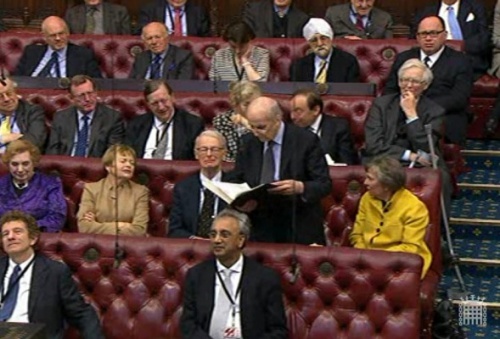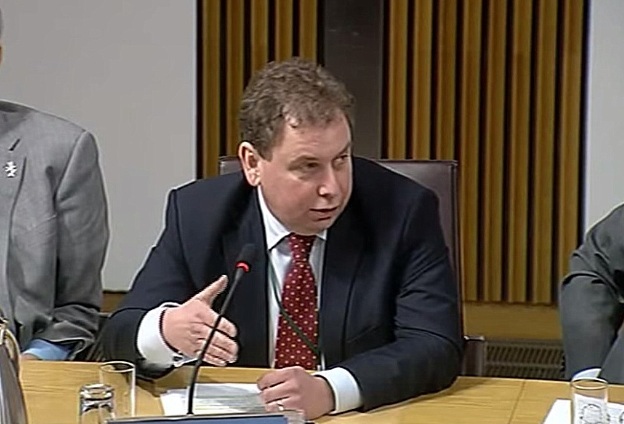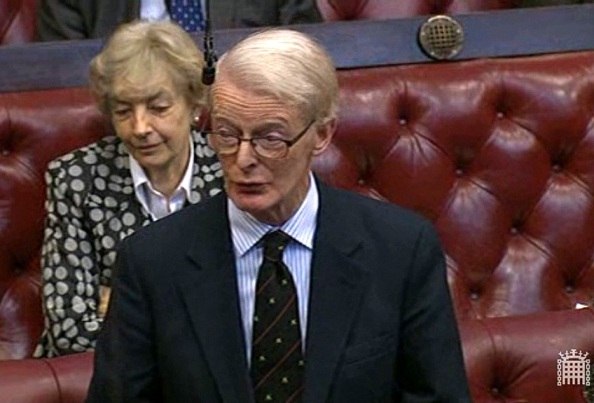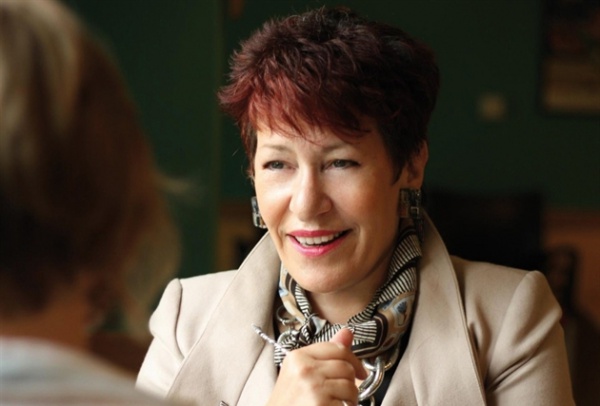Speech highlights, with commentary in italics
Baroness O'Neill of Bengarve (CB):The evidence that the purposes of the Bill were not well understood at Second Reading can be seen in the number of speeches in which noble Lords related very sad stories about difficult deaths where the death would not have been eligible under this legislation, whether because it was a chronic not a terminal condition or because it was, although terminal, not the case that the person had the relevant mental capacity. It would be helpful to us all to focus on what the Bill is actually about, which is assisting suicide. As a number of noble Lords said at Second Reading, the legislation that is intended to be changed by this Bill is the Suicide Act 1961. It is intended to alter the provisions by which people aid and abet another person's suicide. It should be very clear in the text of the Bill that that is what it is for. We all believe in truth in advertising. I suggest that we want clarity in legislation and the same sort of truthfulness.
(Lords Hansard, 16 Jan 2015: Column 1010-1011)
Lord Harries of Pentregarth (CB):Before the Bill started to be discussed, if you asked the average person what the phrase "assisted dying" meant, I think most people would say that it would be to try to help a person who is dying be comfortable and out of pain, and that they had somebody with them to accompany them in this process, this journey out of this world. That is what "assisting" them would be. It would be totally different from taking active steps to end their life.
(Lords Hansard, 16 Jan 2015: Column 1010-1011)
Baroness O'Loan (CB):By focusing on assisted dying as a solution to people's anxieties about end of life care, society is having the wrong debate. If we pass the Bill, people will know that there will be circumstances in which we as a society have decided that we want people to be able to commit suicide with assistance from the medical profession. The Bill provides that people must be assisted to commit suicide in specified circumstances; it does not provide that they must be assisted to die.
I have seen close family members die of motor neurone disease and cancer. I know that they were helped as they came to death by the loving care of good doctors, professional and expert nurses and other medical professionals, and by the appropriate application of palliative care. The Bill is about people who want to take their lives being provided with the wherewithal and being enabled by the medical profession to do so, and it is right that the content of the Bill should reflect that reality. One of our duties as legislators is to try to ensure the greatest possible clarity as we make laws—and it is for that reason that I support the amendment.
(Lords Hansard, 16 Jan 2015: Column 1016)
Lord Winston (Lab):One of the issues that was raised at Second Reading and, I think, on the first day in Committee was the concept that fragile and possibly deranged, angry and distressed elderly people coming into hospital have of the nature of their status as patients. The use of the word "suicide" brings clarity for them, because it makes a very big difference to medical and nursing practitioners, who can quite clearly see that they will not be involved in a process of assisted dying. It is, effectively, suicide, and that limits any notion of how they might feel when they feel that somebody is not really worth supporting in hospital. This is a major problem and will become an increasing one. We see the increasing difficulties in the health service when dealing with cancer care at the moment and the provision of drugs. There will be pressures on budgets and increasing pressures on patients who will feel under pressure to take a decision that is not entirely theirs.
(Lords Hansard, 16 Jan 2015: Column 1006-1007)
Baroness Campbell of Surbiton (CB):By avoiding the term "assisted suicide", the Bill circumvents the framework of measures in place to review, monitor and prevent other forms of suicide. It seeks to exclude deaths under the Bill from the general requirement for a coroner's inquest to be conducted where suicide is considered a possible cause of death. It contains a provision for publication of annual statistics of "assisted deaths" separate from the established arrangements for collecting and publishing statistics on deaths by suicide. It provides for a death under the Bill to be recorded by the registrar as an "assisted death".
I have a question for the Minister. This Government, like their predecessors, have a major cross-departmental suicide prevention strategy. It seeks,
"a reduction in the suicide rate in the general population in England",
"a deliberate act that intentionally ends one's life".
In the light of this definition, will the Minister inform us whether, if the Bill were to become law, he anticipates a rise in the suicide rate, and would he expect the suicide prevention strategy to contain measures to reduce the numbers in this group intentionally ending their own lives?
We all, in this House and outside, understand the word "suicide". It centres on the individual. The act of suicide is the responsibility of the person who commits it, and no other. It is impossible to commit suicide without first consenting to do so. The same does not apply to the word "dying".
(Lords Hansard, 16 Jan 2015: Column 1008-1009)
Lord Mawson (CB):I have been concerned during the process of this debate in the country that some of our media, which have a responsibility to educate and inform the general public about all sides of this argument, have simply gone into campaigning mode. It would be interesting to ask how many of the journalists and commentators have actually read Lords Hansardand dug down into the issues with us, and then honestly and fairly communicated their findings. This issue sadly lends itself to lots of sentimental stories on all sides, but the hard realities are far less palatable in a media-driven age that skims across the surface of our lives.
I am concerned that much of our media are not covered with glory with regard to setting out clearly the complex choices and practical issues that need to be understood if members of the public are to seriously engage with the issues and make informed choices on this matter.
(Lords Hansard, 16 Jan 2015: Column 1007-1008)
The Lord Bishop of Carlisle:The amendments encourage us to move beyond mere slogans. They introduce an element of clarity which is a prerequisite for proper scrutiny. They also bring sharply into focus what the Bill seeks to do and what it does not.
(Lords Hansard, 16 Jan 2015: Column 1011)
The Bishop struck upon a crucial point: 'assisted dying' has no meaning in law, and indeed until the erstwhile Voluntary Euthanasia Society rebranded itself in 2006, it had no meaning in this country at all. As has been admitted previously in the House of Lords (GC51), 'assisted dying' is a more palatable means to an end - more palatable for both legislators and the general public, as Lord Brennan highlighted:
Lord Brennan (Lab): ... it is necessary to better inform both our debate and public debate. In a Gallup poll conducted in 2013, 70% of the participants agreed with the proposition to:
"End the patient's life by some painless means",
but only 51% were ready to agree to:
"Assist the patient to commit suicide".
The more bland and emollient the language used, the more acceptable the proposition becomes. The clearer the language, the more we are in touch with reality, and the better the decision to be made.
(Lords Hansard, 16 Jan 2015: Column 1005)
Lord Howarth of Newport:My Lords, it is a besetting vice of politics to use language which is designed to achieve the maximum of impact and the minimum of definition... In doing so, we degrade our politics. One expects that in advertising; one does not expect it in politics and in government, and it is very bad for the confidence of the public in politics and the legislative process.
There is a better model that it would be worth looking at for a moment. A Bill was brought into the Scottish Parliament by Margo MacDonald entitled the Assisted Suicide (Scotland) Bill; it was not entitled the assisted dying Bill. There is the model of precision, accuracy and candour which the Committee should follow.
(Lords Hansard, 16 Jan 2015: Column 1011)
The second thing that caused me to come to the conclusion that I should put my name to the amendments was Clause 4—so let me read just a little bit to your Lordships. It states:
"The assisting health professional must remain with the person until the person has … self-administered the medicine and died".
Where I come from, I guess that they would call that suicide.
(Lords Hansard, 16 Jan 2015: Column 1015)
Despite such straightforward presentations, proponents of the Bill would not - could not - accept the case for clearer language in their proposals to allow assisted suicide for those deemed to be nearer to death. Indeed, the series of nonsensical, almost incomprehensible responses made clear the total lack of willingness on the part of proponents to see beyond their own conclusions and prejudices.
Baroness Meacher (CB):
If someone wants to commit suicide, they are deciding whether or not they wish to die. This Bill is not about that at all. It is about people who are dying, and the only question for them is how they die and whether they can die with dignity. That is an entirely different question, and it is extremely important that the Bill is absolutely clear about that distinction.
Lord Cormack (Con):My Lords, I hate to cross swords with the noble Baroness, for whom I have enormous respect, but frankly she is wrong. This is about accelerating a death by wilful means, and there is no case for ambiguity here.
(Lords Hansard, 16 Jan 2015: Column 1005)
Lord Tebbit (Con, pictured):I wonder if I could briefly settle this matter. I have just taken the extraordinary step of going to the Library and consulting theOxford English Dictionary. I take it that most of us would accept the definitions of theOxford English Dictionary.No one seems to dissent from that, so I will tell the House what it says here:
"suicide, n. The … act of taking one's own life, self-murder".
Lord Dobbs (Con):...He is absolutely right that the definition of suicide, which he called it self-murder, is killing oneself. I simply cannot believe that that is an accurate reflection of what is being proposed. To end one's life with the assistance of others, including two doctors, perhaps a registered nurse, and a judge, surrounded, hopefully, by those you love, cannot under any circumstances be deemed to be killing oneself.
We have had 2,000 years of Judaeo-Christian culture that has treated suicide as a matter for condemnation, which is why we used to bury them in anonymous graves at crossroads. This is clearly different. To attempt to cast those who take this course of action as suicides is wrong; not only does it not fit into the definitions but it lacks compassion. To term it suicide would only add to the distress of those in this very difficult position.
(Lords Hansard, 16 Jan 2015: Column 1017)
Lord Mawhinney:...what he does make of the fact that it is the movers of the Bill who have insisted on having "self-administered" in Clause 4, which I read earlier? Does self-administered not mean suicide?
Lord Dobbs:Self-administered, when surrounded by one's family and registered nurses, with the assistance of doctors and under the approval of a judge, is not the same situation as the noble Lord suggests.
(Lords Hansard, 16 Jan 2015: Column 1018)
Lord Dobbs referred to popular attitudes to suicide and his desire not to confer such connotations on those undoing 'assisted death', but as Lord Gordon and the Bishop of Chester point out, suicide is a term with a set definition already recognised to cover any number of circumstances. Connotations are a separate matter:
The Lord Bishop of Chester:My Lords, briefly, the debate is now running into the sand a little and I hope that we can move on. I have great sympathy here for the noble Lord, Lord Dobbs. The word "suicide" could be applied to a member of the French resistance who, knowing that he was going to be captured and thinking that he would not be able to resist the Gestapo, took own life—an action I would completely understand—but it could also be applied to a suicide bomber. The word is so multivalent that once we start discussing it, we get into this interminable process. I suggest that we have now heard the arguments and should move on.
(Lords Hansard, 16 Jan 2015: Column 1019)
Lord Gordon of Strathblane (Lab): There are still powerful arguments for allowing assisted suicide—and, although I am opposed to it, I recognise them. However, let us call it what it is. It is close to misleading to have the title of the Bill as it is the moment, any more than the title of the Homicide Act should be "Assisted Dying (Involuntary)". No one would seriously describe a terrorist attack as assisted dying—but they have helped people to die, so I suppose you could justify it on that basis.
We try to narrow down a definition. If it is taking someone's life against their will, we call it homicide or murder. If it is someone taking their own life, we call it suicide, and we have the Suicide Act 1961. It is that Act, not any other, that is amended by the Bill. How anyone can argue that a Bill amending the Suicide Act should not be called the Assisted Suicide Bill genuinely escapes me.
(Lords Hansard, 16 Jan 2015: Column 1016)
Lord Trimble noted that the Bill is adorned with various euphemisms -
Lord Trimble (Con):[referring to] the contribution from my noble friend Lord Mawhinney, who referred to Clause 4. I observe that that clause talks about prescribing,
"medicines for that person to enable that person to end their own life".
Does he agree with me that the worst euphemism here is the use of the word "medicines"?
(Lords Hansard, 16 Jan 2015: Column 1024)
- which Lord Deben clearly had in mind when he suggested that the use of euphemisms harms the stated intentions of the Bill's proponents, if they are indeed sincere, before concluding with a well taken understanding of what truth is in the public square.
Lord Deben (Con):This is a narrowly drawn Bill and I believe that those who promote it should be very concerned to ensure that the world understands it as a narrowly drawn Bill. That is why... I think that "assisted dying" gives people outside a misunderstanding of what this is about, which should be to the detriment of those who want the Bill to pass—I do not, but they should understand that it is to their detriment. I also think that this House has a real duty in a world that increasingly uses language not to explain and express but to change people's approaches, because it is worded in that way.
I will make just one last comment. Cardinal Newman, in his great debates with Charles Kingsley, said that truth was not what left the mouth but what was heard in the ear—that we can tell the truth in the sense that we can defend that what we said was absolutely correct but we can say it in a way that we know will be heard differently from the way in which we have expressed it. When we discuss a Bill of this kind, we have to be very careful to remember that absolutely essential definition: truth is what the hearer hears. I think "suicide" is what the hearer needs to hear, and all sides of the House should accept that. "Assisted dying" is not what the hearer needs to hear because that will mean something quite different.
(Lords Hansard, 16 Jan 2015: Column 1010)
Amendment 12B was disagreed by 179-106.
© Hansard content and Parliament TV still published under Open Parliament License









